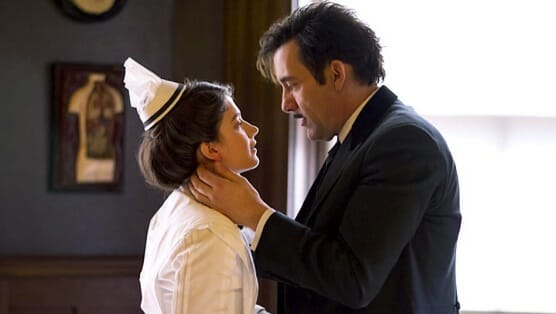
The standard operating procedure for most TV shows has been to open up the role of director to a variety of people, including cast members, famous film directors, and veterans of the small screen business. And it has done little harm to the thousands of episodic series that have come and gone over the years.
But between the haunting work of Cary Fukunaga on True Detective and Steven Soderbergh’s clear vision for The Knick, there’s a case to be made for filtering every episode of a series through a single person. How better to sustain a high level of quality from week to week, and to keep the tone consistent throughout? True, that tends to be the work of the show runner and actors, but being guided through each step of the journey by a single Virgil or Beatrice.
Right now on The Knick, Soderbergh is playing the role of Virgil, as many of the characters are reaching their own personal nadirs, much of it brought on by a lack of supplies in the hospital (due to ships getting sunk in the Atlantic as a result of the ongoing Philippine-American War). Chief among the losses are the leaves needed to make cocaine. While that pushes Barrow to start begging for more money from the Robertsons and the Catholic Church (who both turn him down), it sends Thackery into awful-looking withdrawals.
It’s not just the lack of a fix gnawing at the doctor’s mind, however. The need for him to be considered the greatest innovator in the field of surgery is pushing his sanity to the brink. Here’s where Soderbergh comes into play. Through many scenes, he keeps the camera fixed on Clive Owen’s face even as action is going on around him. You see the cold sweat on his forehead, watch his jaw clenching underneath the skin, and see the damp desperation in his eyes. It’s frankly more horrifying to see his gaunt, exhausted mug, than to see the big abscess that they remove from a patient’s face at the end of the episode.
For most of the other doctors, their own lives are in a state of tension. Gallinger’s attempt to bring some peace to his wife in the form of a six-month-old orphan backfires almost immediately. And Chickering is caught between wanting to stay and innovate (and keep an eye on Nurse Elkins) at The Knick, and the urgings of his father to join the family practice. Only Edwards seems to be enjoying himself thanks to the company of Cornelia at his hotel. As an aside—their scene together in his room is one of the show’s sexiest moments, with each trading post-coital conversation, laden with innuendo and raw desire.
If all that weren’t enough, Typhoid Mary gets a day in court, claiming unlawful entrapment by Cornelia and the city health inspector. She wins her case, and towards the end of the episode, is found in another employment agency ready to get back to the kitchen. If you know the story at all, you’ll know that that is far from a good thing.
Of course, that’s the beauty of setting a show like this in the past; we can look at it through our modern eyes and marvel at how far we’ve come. It also leaves us scrambling to wonder what sort of ills—societal or mental or physical—will befall the characters on the show. The possibilities are varied, and none of them feel particularly good.
Robert Ham is a Portland-based freelance writer and regular contributor to Paste. You can follow him on Twitter.